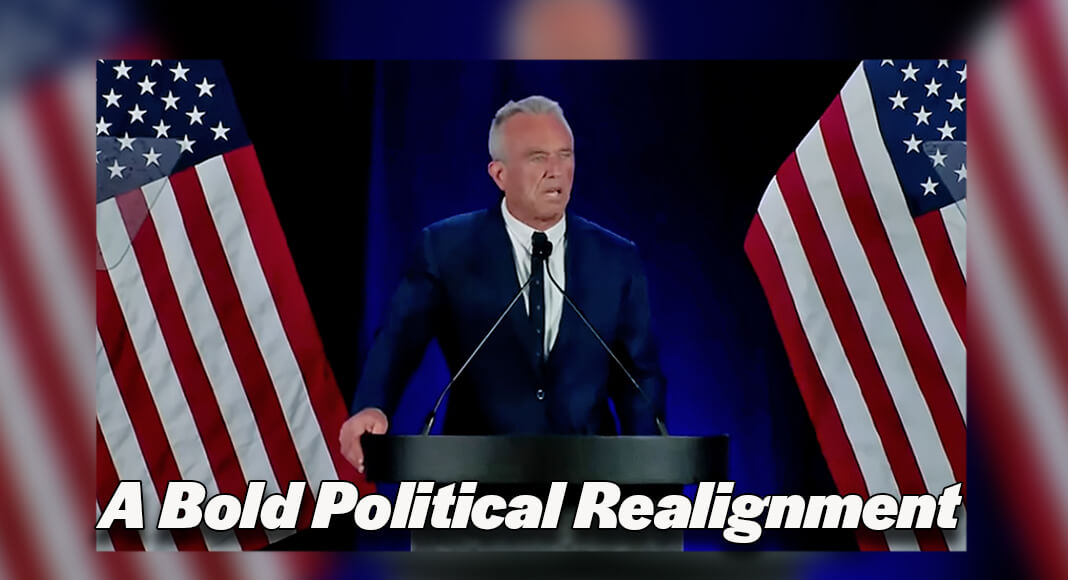
Texas Border Business
Texas Border Business
Sixteen months after announcing his candidacy for President of the United States, Robert F. Kennedy Jr. made the surprising decision to suspend his campaign and align himself with former President Donald Trump. In a fiery and passionate speech, Kennedy laid out his reasons for the drastic shift in his political journey, citing disillusionment with the Democratic Party and his alignment with Trump’s policies on critical issues.
RFK Jr. began his campaign as a Democrat, a party he has been deeply connected to since childhood. “In April of 2023, I launched my campaign for President of the United States. I began this journey as a Democrat, the party of my father, my uncle, the party to which I pledged my allegiance long before I was old enough to vote,” Kennedy reminisced. He spoke fondly of the Democratic Party of his youth, a party he described as “the champions of the Constitution of Civil Rights,” which stood “against authoritarianism, against censorship, against colonialism, imperialism, and unjust wars.”
However, Kennedy argued that the Democratic Party had changed dramatically from the ideals he once admired. “I left that party in October 2024 because it had departed so dramatically from the core values that I grew up with,” he stated, criticizing the party for becoming “the party of war, censorship, corruption, big pharma, big tech, big ag, and big money.” He condemned the party for “abandoning democracy by canceling the primary to conceal the cognitive decline of the sitting president.”
Kennedy did not hold back in his critique of the Democratic National Convention (DNC), accusing it of subverting democratic processes. He alleged that the DNC “dragged us into court state after state, attempting to erase their work and to subvert the will of the voters who had signed those petitions.” He went further to claim that the DNC employed “DNC-aligned judges to throw me and other candidates off the ballot and to throw President Trump in jail” and orchestrated “a sham primary that was rigged to prevent any serious challenge to President Biden.”
Kennedy also aimed at Vice President Kamala Harris, who he claimed had been installed as a candidate without a fair election. He highlighted what he sees as a lack of transparency and democratic engagement, contrasting her approach to his willingness to engage with the media and the public. “My uncle and my father both relished debates. They prided themselves on their capacity to go toe to toe with any opponent in the battle over ideas. They would be astonished to learn of a Democratic Party presidential nominee who, like Vice President Harris, has not appeared in a single interview or an unscripted encounter with voters for 35 days.”
Much of Kennedy’s speech was devoted to criticizing what he perceived as a coordinated effort by the DNC and the media to manipulate public perception and suppress dissent. He described the DNC’s efforts to boost Vice President Harris’s popularity as a “Chicago circus” filled with “smoke and mirrors and balloons,” arguing that “instead of showing us her substance and character, the DNC and its media organs engineered a surge of popularity for Vice President Harris based upon, well, nothing—no policies, no interviews, no debates.”
Kennedy expressed deep concern over the broader implications of these actions for democracy. “What most alarms me isn’t how the Democratic Party conducts its internal affairs or runs its candidates. What alarms me is the resort to censorship and media control and the weaponization of the federal agencies.” He argued that this manipulation represents a fundamental threat to free expression, stating, “When a US president colludes with or outright coerces media companies to censor political speech, it’s an attack on our most sacred right, a free expression.”
Aligning with Trump: A Surprising Turn
In a dramatic turn, Kennedy announced his decision to suspend his independent candidacy and throw his support behind Donald Trump. “Three great causes drove me to enter this race in the first place primarily,” he explained, listing “free speech, the war in Ukraine, and the war on our children” as his primary motivations. He criticized the Biden administration’s handling of the Ukraine conflict, stating, “We pushed Russia into a disastrous alliance with China and Iran. We’re closer to the brink of nuclear exchange than at any time since 1962.”
Kennedy described his discussions with Trump and their shared commitment to ending “forever wars,” tackling the “chronic disease epidemic,” and protecting free speech. He emphasized that, despite past differences, he found common ground with Trump on these critical issues. “I was a ferocious critic of many of the policies during his first administration, and there are still issues and approaches upon which we continue to have very serious differences,” he acknowledged. However, he noted, “We are aligned with each other on other key issues.”
Kennedy revealed that Trump had proposed a “unity party,” drawing inspiration from Abraham Lincoln’s “team of rivals.” According to Kennedy, this arrangement would allow them to “disagree publicly and privately and fiercely, if need be, on issues over which we differ while working together on the existential issues upon which we are in concordance.”
In his words, Kennedy’s decision to suspend his campaign and support Trump is “a hard rendering decision,” but one he believes is necessary for the greater good. He concluded, “I feel a moral obligation to use this opportunity to save millions of American children above all things.”
RFK Jr.’s speech marks a significant realignment in the current political landscape, demonstrating his deep disillusionment with the Democratic Party and unexpected alliance with Donald Trump. As the political world digests this surprising development, the implications of this new partnership will continue to unfold, potentially reshaping voter dynamics and campaign strategies in the coming months.














